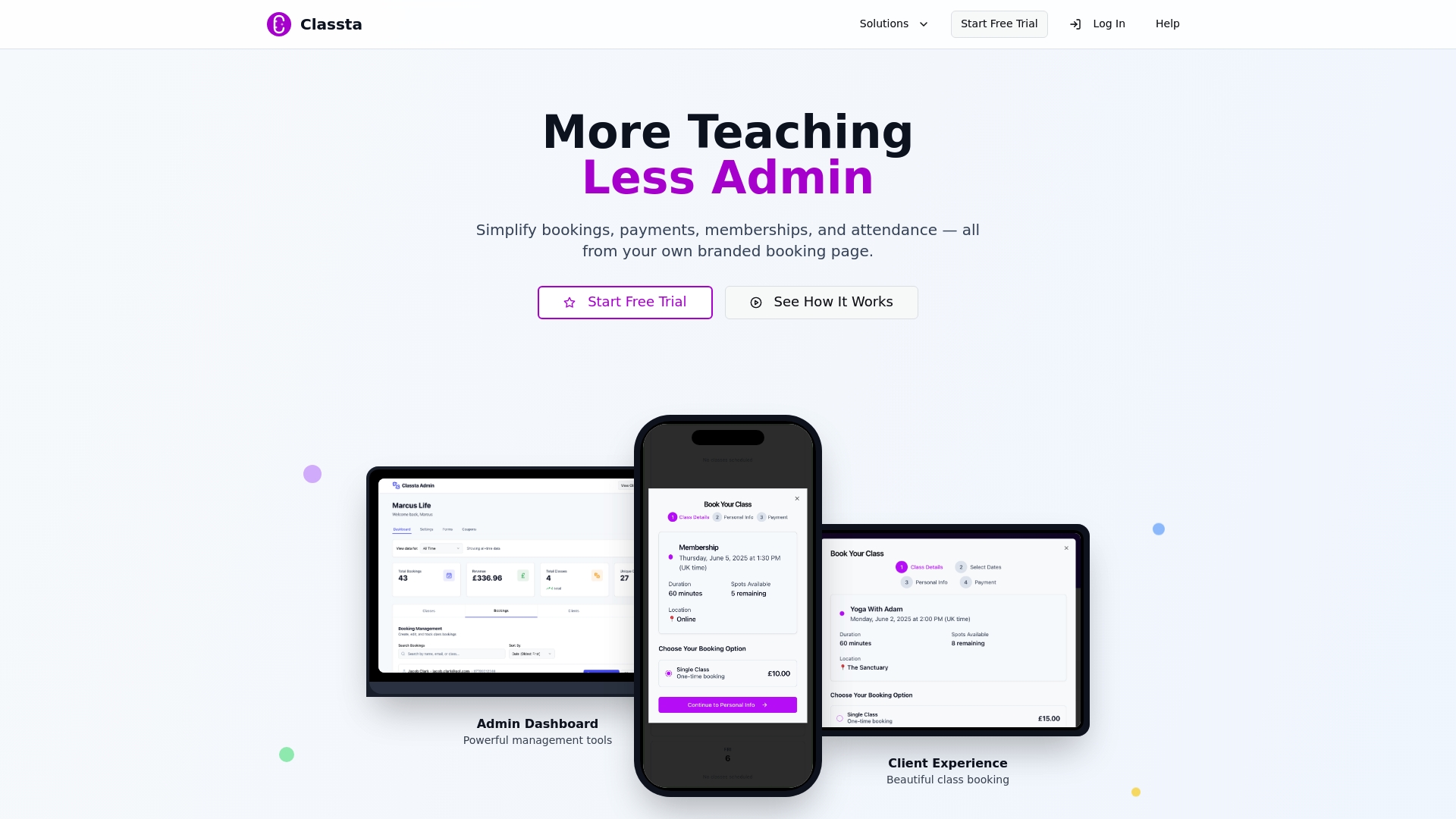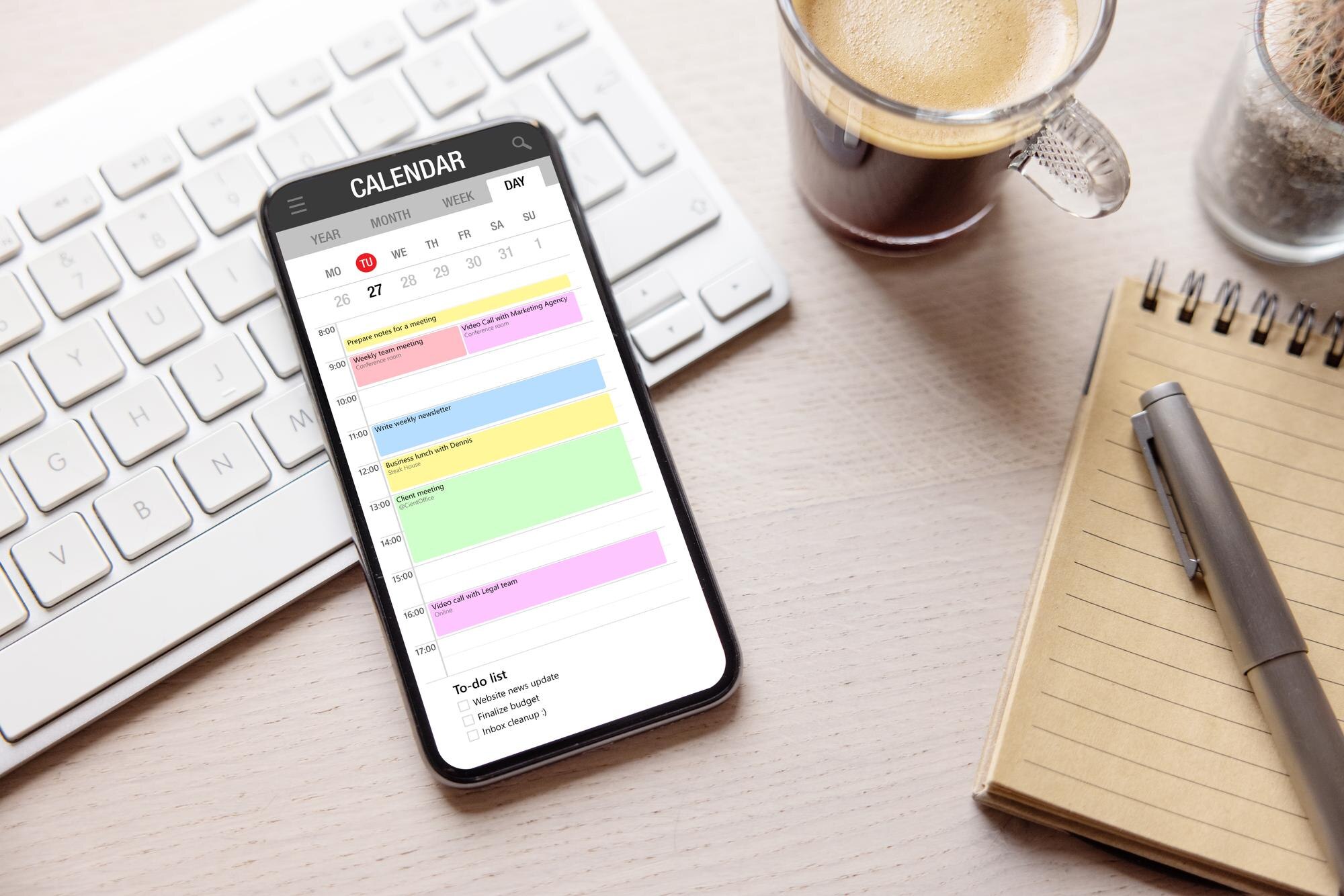Managing yoga classes might sound simple. You sort out a timetable, let people sign up, and you’re done. Or so you’d think. But the truth is, 73.55 percent of yoga students prefer flexible class schedules and will skip sessions if planning feels like a headache. This flips the idea of basic coordination on its head. Because what actually sets successful yoga instructors apart is not just their teaching, but how cleverly they structure every booking and communication—the workflow behind the calm.
Table of Contents
- What Is A Yoga Class Scheduling Workflow?
- The Importance Of Effective Scheduling In Yoga Classes
- Key Components Of A Successful Scheduling Workflow
- How Technology Transforms Yoga Class Scheduling
- Best Practices For Optimising Your Scheduling System
Quick Summary
| Takeaway | Explanation |
|---|---|
| Streamline administrative tasks with technology | Implement digital platforms to automate scheduling processes, enhancing efficiency for instructors and participants. |
| Flexible scheduling boosts student engagement | Offer various class times and options to accommodate diverse participant schedules, increasing commitment to practice. |
| Data analytics inform scheduling decisions | Use performance tracking tools to analyse attendance patterns, helping optimise class offerings and maximise participation. |
| Consistent communication enhances client satisfaction | Maintain regular updates about class schedules and changes to foster trust and reliability among students. |
| Regularly assess and refine scheduling systems | Continuously evaluate and improve scheduling workflows to adapt to client needs and optimize user experience. |
What is a Yoga Class Scheduling Workflow?
A yoga class scheduling workflow represents a systematic approach for managing and coordinating yoga class logistics, encompassing all processes from initial client registration to final class attendance tracking. This comprehensive system integrates multiple administrative tasks to create a seamless experience for both yoga instructors and participants.
Below is a table summarising the core components of a yoga class scheduling workflow and their primary purposes for both instructors and participants.
| Component | Description |
|---|---|
| Client Registration | Collects participant details and initiates the scheduling process |
| Class Booking | Facilitates selection and reservation of class sessions |
| Payment Processing | Handles secure transactions for class fees and memberships |
| Attendance Management | Tracks participant attendance, aiding in monitoring and reporting |
| Communication Mechanisms | Provides updates regarding schedules and any changes |
Core Components of Scheduling
The fundamental elements of a yoga class scheduling workflow include client registration, class booking, payment processing, and attendance management. These interconnected processes require strategic planning and efficient technological integration to function smoothly.

A robust workflow enables yoga instructors to streamline administrative tasks, reduce manual paperwork, and focus more on delivering high-quality yoga instruction. According to Cornell University’s Recreational Services, an effective scheduling system must address several critical aspects:
- Transparent class availability
- Simple registration mechanisms
- Efficient payment collection
- Accurate participant tracking
Technological Enablement
Modern yoga class scheduling workflows leverage digital platforms and software solutions to automate complex administrative processes. These technological tools provide instructors with capabilities such as:
- Real-time class calendar management
- Automated client communication
- Secure online payment processing
- Membership and attendance tracking
By implementing a structured workflow, yoga instructors transform their administrative processes from time-consuming manual tasks into streamlined, efficient operations that enhance overall business productivity and client satisfaction.
This table outlines how technology enhances various aspects of yoga class scheduling by transforming traditional administrative processes.
| Scheduling Aspect | Traditional Process | Technology-Enabled Process |
|---|---|---|
| Class Calendar Management | Manual, time-consuming | Real-time, automated |
| Client Communication | Phone calls or emails | Automated notifications |
| Payment Collection | Cash or manual invoicing | Secure online transactions |
| Attendance Tracking | Paper-based sign-in sheets | Digital tracking in real time |
| Data Analysis | Manual record-keeping | Automated analytics and reporting |
The Importance of Effective Scheduling in Yoga Classes
Effective scheduling represents a critical foundation for successful yoga instruction, transforming the administrative landscape from chaotic management to strategic planning. By implementing a well-designed scheduling approach, yoga instructors create an environment that supports consistent practice, student engagement, and professional growth.
Student Engagement and Participation
Scheduling directly influences student participation and commitment to yoga practice. According to a research study with medical students, flexible scheduling significantly impacts participation rates, with 73.55% of participants expressing preference for adaptable class timings. This demonstrates that thoughtful scheduling is not merely an administrative task but a strategic tool for maintaining student interest and retention.
Key considerations for maximizing student engagement through scheduling include:
- Offering diverse class time options
- Maintaining consistent weekly schedules
- Providing advance notice of class changes
- Creating accessible booking mechanisms
Instructor Resource Management
Beyond student perspectives, effective scheduling enables yoga instructors to optimize their professional resources. Strategic scheduling allows instructors to balance teaching hours, personal practice, and administrative responsibilities. By implementing a structured workflow, instructors can:
- Allocate teaching time efficiently
- Prevent instructor burnout
- Maintain a predictable income stream
- Plan professional development activities
Business Performance and Growth
A well-designed scheduling system serves as a fundamental driver of business performance for yoga professionals. Precise scheduling impacts financial stability, client satisfaction, and overall studio reputation. Instructors who master scheduling techniques can create a more predictable and sustainable business model, transforming their yoga practice from a passion project into a professional enterprise.
By recognizing scheduling as a strategic tool rather than a mundane administrative task, yoga instructors can unlock significant potential for growth, student satisfaction, and professional success.
Key Components of a Successful Scheduling Workflow
A successful yoga class scheduling workflow integrates multiple technological and operational elements to create a comprehensive system that supports both instructors and participants. Understanding these key components enables yoga professionals to develop robust, efficient administrative processes that enhance overall class management and client experience.
Digital Platform Integration
Digital platforms form the backbone of modern yoga class scheduling workflows. These technological solutions provide sophisticated tools for managing complex administrative tasks with minimal manual intervention. According to the Yoga Service Collective’s Best Practices Guide, effective digital integration involves several critical aspects:
- Automated class registration systems
- Real-time availability tracking
- Secure payment processing capabilities
- Client communication mechanisms
Flexible Scheduling Parameters
Successful scheduling workflows prioritize flexibility and accessibility. This approach recognizes that participants have diverse schedules and preferences. By implementing adaptable scheduling parameters, yoga instructors can accommodate various client needs while maintaining operational efficiency.
Key scheduling flexibility considerations include:
- Multiple class time options
- Sliding scale pricing models
- Drop-in and membership registration formats
- Online and in-person booking channels
Performance Tracking and Analytics
Comprehensive scheduling workflows incorporate performance tracking and analytics as essential components. These analytical tools enable yoga instructors to:
- Monitor class attendance trends
- Understand participant preferences
- Optimize class scheduling strategies
- Make data-driven business decisions
By systematically integrating these key components, yoga instructors transform scheduling from a mundane administrative task into a strategic business tool that supports professional growth and client satisfaction.

How Technology Transforms Yoga Class Scheduling
Technology has fundamentally revolutionized yoga class scheduling, converting traditionally manual and time-consuming processes into streamlined, efficient digital experiences. By leveraging advanced technological solutions, yoga instructors can now manage complex administrative tasks with unprecedented ease and precision.
Digital Automation Capabilities
Digital platforms have dramatically transformed scheduling workflows by introducing sophisticated automation technologies. According to research in the International Journal of Yoga, technological innovations enable yoga instructors to simplify administrative processes through:
- Instant class registration systems
- Automated participant communication
- Real-time availability tracking
- Seamless payment processing
Enhanced Client Interaction
Modern scheduling technologies create more interactive and personalized experiences for yoga participants. These digital tools enable instructors to develop deeper connections with clients by providing:
- Customizable booking interfaces
- Personalized class recommendations
- Automated reminder notifications
- Flexible rescheduling options
Data-Driven Decision Making
Technology transforms scheduling from a purely administrative function into a strategic business intelligence tool. By capturing and analyzing comprehensive data, yoga instructors can:
- Track attendance patterns
- Understand participant preferences
- Optimize class offerings
- Develop targeted marketing strategies
Through intelligent technological integration, yoga instructors can transcend traditional scheduling limitations, creating more responsive, efficient, and client-centric operational models that support both professional growth and participant satisfaction.
Best Practices for Optimising Your Scheduling System
Optimising a yoga class scheduling system requires strategic planning, technological integration, and a deep understanding of both instructor and participant needs. By implementing carefully crafted practices, yoga professionals can transform their scheduling workflows into highly efficient, user-friendly platforms that support business growth and client satisfaction.
Strategic System Configuration
Effective scheduling systems demand meticulous configuration and ongoing refinement. According to PubMed research on yoga interventions, successful optimization involves understanding nuanced participant engagement strategies:
- Regularly reviewing scheduling data
- Identifying peak attendance periods
- Analyzing participant booking patterns
- Implementing flexible scheduling options
User Experience Enhancement
Creating an intuitive, accessible scheduling system is crucial for maintaining client engagement. Yoga instructors should focus on designing platforms that prioritize user convenience and simplicity. This involves developing interfaces that:
- Minimize booking complexity
- Provide clear class information
- Enable seamless mobile interactions
- Support multiple booking channels
Continuous Performance Monitoring
Scheduling system optimization is an ongoing process that requires consistent evaluation and adaptation. By implementing robust monitoring mechanisms, yoga instructors can:
- Track system performance metrics
- Gather client feedback
- Identify potential improvement areas
- Implement data-driven refinements
Successful scheduling system optimization transcends mere technological implementation, representing a holistic approach to creating responsive, client-centered administrative processes that support both professional objectives and participant experiences.
Transform Your Yoga Class Scheduling Workflow with Classta
Are you feeling weighed down by scattered class registrations, endless manual admin, or missed attendance tracking? The article highlighted how an effective yoga class scheduling workflow is key to reducing manual work, boosting client satisfaction, and freeing up your energy for teaching – not paperwork. If you have ever struggled with inconsistent payment processing, forgotten reminders, or lack of visibility into your class performance, there is a smarter way.

See what is possible when you let technology take care of the hard work. Classta.co brings together the vital tools you need – from custom booking calendars, automated payment collection, and membership management, to real-time attendance and AI-powered automation – in one simple interface. Why not reclaim your time and see how easy class scheduling can be? Join other forward-thinking instructors using Classta to transform their workflow. Explore more and start your journey today at Classta’s booking and management solution. If you want your yoga classes to run smoother than ever, there has never been a better time to make the switch.
Frequently Asked Questions
What are the core components of a yoga class scheduling workflow?
The core components of a yoga class scheduling workflow include client registration, class booking, payment processing, and attendance management. These elements work together to streamline the management of yoga classes.
How does technology enhance yoga class scheduling?
Technology enhances yoga class scheduling by automating administrative tasks, enabling real-time class calendar management, and facilitating secure online payments. This leads to a more efficient and user-friendly experience for both instructors and participants.
Why is effective scheduling important for yoga classes?
Effective scheduling is crucial as it influences student engagement and participation. It helps in creating a consistent practice environment, optimising instructor resource management, and improving overall business performance and client satisfaction.
What best practices should I follow to optimise my yoga class scheduling system?
To optimise a yoga class scheduling system, focus on strategic system configuration, enhance user experience by creating an intuitive interface, and implement continuous performance monitoring to evaluate and refine scheduling processes.











 :
:








 This foundational knowledge will guide your strategy for implementing a more streamlined and efficient booking system that saves time and enhances client experience.
This foundational knowledge will guide your strategy for implementing a more streamlined and efficient booking system that saves time and enhances client experience.



